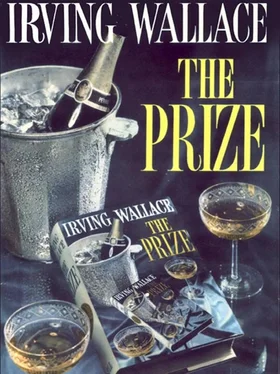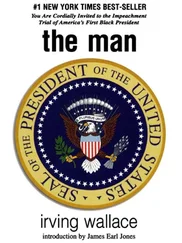The invitation was for a formal dinner party, given by Ragnar Hammarlund, host, and Märta Norberg, hostess, honouring the visiting Nobel Prize laureates. The time was seven o’clock of the evening of December sixth. The dress was, in Swedish, smoking , which meant black tie and evening dress. To this was added O.S.A.-om svar anhålles -meaning R.S.V.P., and below that was listed Hammarlund’s private telephone number.
While all twenty guests had responded to the invitations affirmatively, several hours before the dinner it appeared that the list might be reduced to nineteen. Emily Stratman had telephoned Hammarlund’s secretary to explain that her uncle was not well-nothing serious, simply fatigue-and that he wished to rest and begged to be excused. When informed of this, Hammarlund had personally telephoned Count Bertil Jacobsson at the Foundation and requested him to substitute for Professor Stratman as Emily’s escort. Jacobsson had been agreeable, and Hammarlund was satisfied that the guest list would once again number twenty.
Now, it was 7.15 in the evening.
On the Djurgårdsbrunns Canal, beyond the ornate metal gate and artificial lily pond, the first-storey windows of Hammarlund’s pillared Taj Mahal-Åskslottet-were ablaze with festive light. Since the Scandinavian guests had been bred on Swedish punctuality, and since the foreign guests had been forewarned about it, all twenty visitors were inside the huge and splendid main living-room.
The last callers to arrive had just come through the living-room archway. This party consisted of Jacobsson, Emily Stratman, Andrew Craig, and Leah Decker. Their host and hostess waited inside the entrance to welcome them with handshakes.
Ragnar Hammarlund, attired in faultless evening wear by Bond Street, seemed more featureless than ever. His white, hairless visage could hardly be discerned, so that his person resembled some eugenic cross between headless horseman and invisible man. Beside him, as fill-in hostess for the evening, a role she so often performed, was the legendary Märta Norberg.
As they awaited their turn to be greeted, Leah whispered to Craig in the tremulous voice of fan worship, ‘My, doesn’t she look just like she did in pictures?’
Indeed, Märta Norberg looked just as she had looked on thousands of billboards and magazine covers and in legitimate theatre and motion picture advertisements. She also looked at forty-two as she had looked at thirty-two and twenty-two, the perfectly preserved product of the most costly international beauticians. Despite the trademark slouch of her broad shoulders-that had long reminded awed audiences in London, New York, Cairo, and Bombay of disenchanted world-weariness and that had offered overtones of a sexuality both mystical and unique-Märta Norberg was tall, considerably taller than Hammarlund beside her. The other trademarks were also in evidence, the trademarks so endlessly celebrated in the fan magazines: ‘her mouse-coloured hair, to the shoulders, abandoned and recklessly uncombed… her sunken pool of grey eyes, bearing the unconquered enigma of all womanhood… her patrician nose that launched a thousand theatres… her maddeningly superior smile, the smile of a Valkyrian Mona Lisa… her insinuating voice, a husky throb caught in a swan throat.’
Awaiting his introduction, Craig found himself almost as captivated as Leah. If he had passed her on the street, and she an unknown, he wondered if he would have bothered to turn. Technically, her features and physique were imperfect, the face too long and sunken, the bosom-breasts like matched oversized buttons-too flattened beneath the clinging silk crepe gown, with high front, bare back, and the body too straight. What made it all desirable was the world wide reputation that she wore like a royal cape.
But then, when he was the last to take her firm, slender hand, he felt the electric current of her magnetism and understood the allure of her personality.
‘Craig,’ he said, introducing himself in the formal Swedish fashion.
‘I know,’ she said deeply. ‘I have been entranced by all your books. I am Märta Norberg.’
‘I know,’ he said. ‘I have been entranced by all your faces-Camille, Nora Helmer, Beatrice, Sadie Thompson, Lady Windermere.’
Her lips curled ever so slightly. ‘You speak as well as you write, I see. Come, Ragnar will lead you to the guests.’
Again, Swedish formality prevailed. The protocol of introduction had been given Leah by Mr. Manker, and Leah had passed it on to Craig. Apparently Emily, so delicate in her sleeveless silk jersey evening dress, had been well briefed by Jacobsson, for she was performing as Craig knew that he must perform.
The fourteen guests who had arrived before stood waiting, some with cocktails, some with highballs, in an uneven semicircle, a formation almost identical to the one Craig had witnessed at the Royal Banquet. He moved awkwardly inside the circle, behind Leah and Emily. As he came face to face with each new guest, he introduced himself by surname, and the guest murmured back his or her surname. The ones he had met before-the Drs. Marceau, Dr. Farelli and his wife, Dr. Garrett and his wife, Konrad Evang, the Norwegian-these, Craig met again with spontaneous informality. But with the new ones, he conformed to strict etiquette. There were Baron Johan Stiernfeldt, a representative of the King, and the Baroness Stiernfeldt. There was Miss Svensson, the opera contralto. There were General Alexei Vasilkov, military attaché of the Russian Embassy, and his wife Nadezhda Vasilkov. There was Mrs. Lagersen, with the countenance of a monkey, whose claim to fame was that she had known the friendship of Mette Sophie Gad, Paul Gauguin’s bewildered Danish wife, in Copenhagen during 1905, and had recently published A Memoir of Mette and Paul . There was Dr. Oscar Lindblom, Hammarlund’s research chemist, who was thin and uncomfortable.
The moment that the formal introductions were concluded, since it was known that these were the last of the guests to arrive, the semicircle of formality splintered off into conversational foursomes and pairs.
Leah, who pretended to have forgiven Craig for their bad night and now had resumed her old relationship of domineering nurse and ever-present conscience to him, began to rave about the expensive living-room, decorated in late Georgian style, and for the first time, Craig became attentive to his surroundings.
The great room, wainscoted from floor to ceiling, every panel featuring eighteenth-century engravings, was broken on one wall by an enormous fireplace faced in Carrara marble. At the far end, on top of a small platform, beside the French doors that led onto a terrace overlooking the botanical gardens, was a five-piece orchestra, definitely Parisian, that was playing muted standbys and operetta classics. A wispy, tiny French chanteuse , attractively anæmic, all gesticulation, joined them to sing unobtrusively, nostalgically.
Against the opposite wall stood two Chippendale sideboards of mahogany with ornately carved legs, one magnificently laden with a peacock of sculptured ice and surrounded by cut hothouse orchids and a rainbow of smorgåsbord -pickled salt herring, salmon cutlets, marinated mussels, veal meatballs, Gotland asparagus, braised beef rolls, boiled potatoes, rye rusks and saffron bread, smoked goose breast, endless cheeses-which was served by two wholesome Swedish girls in Dutch aprons. The second table held glasses and bottles of drink, and was officered by two bartenders in red-and-black uniforms. Circulating through the room was Hammarlund’s liveried butler, Motta, an elderly Swiss with the face of an inebriated St. Bernard. Motta carried, and tendered, a large tray of hot-American-style hors-d’oeuvres . Behind him, with dishes and napkins, dainty in her starched dress, was the Finnish parlour-maid.
Читать дальше












